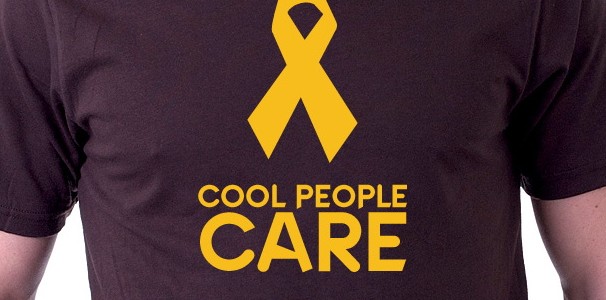Get out your Gold Ribbons! On September 1, 2011, Barack Obama proclaimed that September 2011 is National Childhood Cancer Awareness Month.
The Facts About Childhood Cancer:
- Each year in the United States approximately 12,400 children from birth to 19 years old are diagnosed with cancer.
- Approximately 1 in 300 boys and 1 in 333 girls will develop cancer before the age of 20.
- Children who have had radiation or chemotherapy for prior cancer treatments are at higher risk to get cancer again.
Types of Childhood Cancer
Childhood Cancer rates vary by cancer type. Unfortunately, many childhood cancers have about a 5-year prognosis. Here are the most common forms of Childhood Cancer:
- Bone Cancers
- Brain Cancers
- Leukemia
- Hepatoblastoma
- Lymphomas
- Neuroblastoma
- Retinoblastoma
- Rhabdoid Tumors
- Sarcomas
- Wilms Tumor
Childhood Cancer Treatments
- Chemotherapy
- Radation
- Surgery
- Treatment strategies depend on the type of cancer the child has, and to some extent, the treatment facility.
It is very important that the child knows what is going on. Make sure they know that cancer is not their fault. If the child is too young it is ok to tell them that they are sick, and that the doctor is going to give them medicine to make them feel better.
Cancer Clinical Trials
Clinical Trials are standard practice in determining cancer treatment and research for children, adolescents and young adults. Clinical trials are used to determine the most effective and safest treatment for a disease.
- A higher percent of children compared to adults enter clinical trials for cancer treatment. While less than 5 percent of patients under the age of 29 diagnosed with cancer are enrolled in clinical trials, 60 percent of patients under 29 are enrolled in trials.
- A clinical trial studies a particular treatment plan. The doctors will administer the exact same treatment to all patients.
- Clinical trials are designated phase I, II, or III. Phase I studies the drugs that are administered to the patient. Phase II determines if the drug is effective against the cancer. Phase III studies small changes to the current care of the cancer to determine if the changes improve the survival rate.
Getting Help
Dealing with the financial aspects of cancer can be very difficult. There are organizations that are able to financially support childhood cancer patients. St. Jude is a pediatric cancer research center where families never pay for treatment that is not covered by insurance. Not only does St. Jude focus on the patient, they focus on the entire family of the patient. There are so many companies ready to help when families are thrown into difficult situations such as childhood cancer.
